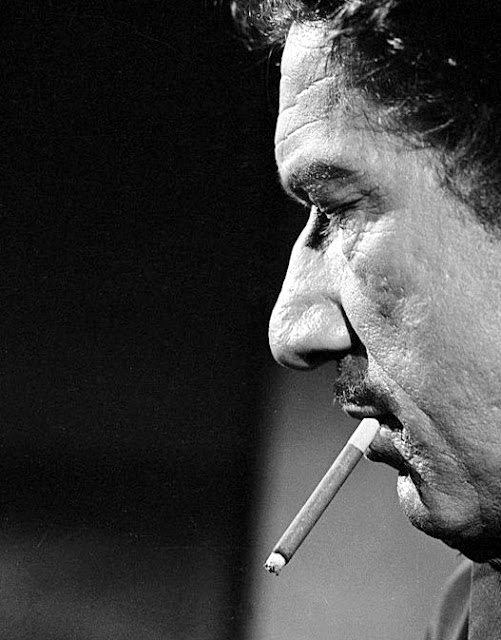 |
| You're tired, Boss. |
Louis Shalako
Gilles bit back another yawn.
She nodded, grinning slightly. She pulled the plug, suds began to drain…she put the plug in its usual spot. She wiped her hands on the towel, hanging there beside the counter.
“You have to admit, you do get up rather early.”
“I can’t seem to decide what time it is.” The days were getting so short, he left the house before sunrise, and arrived home after dark.
There was some kind of a metaphor.
No, he’d woken up about three a.m., and unable to sleep, had gotten up, he had read reports…he had read the newspapers, and had innumerable cups of coffee, black with a bit of sugar. Twenty cigarettes…she’d learned to read the signs, and in such a short time.
 |
| She can read the signs. |
There was a rumble from the general direction of his stomach. He slouched up against a corner of the countertop, not quite ready to eat, although a small glass of wine sat untouched as of yet.
It would help to warm him up, and he idly picked it up and sipped at it.
It was only the fact that he had left early, in order to catch the last remaining rays of the sun on his walk home. Yes, it must be all that fresh air. The temptation to have a nap was strong, but he’d only wake up in the middle of the fucking night again…he sighed.
Deeply. With the first faint heat of the wine in his guts—
“Things are always darkest before the dawn.” His grandmother had said that. “But honestly, it feels like the middle of the night, and it’s barely six.”
Across the rear of the kitchen, the lights on across the way were warm oblongs in the darkening night. With the clouds again on the western horizon, cutting the evening short, with the city lights and a bit of grime on the outside of the glass, there was nothing of any real form to be seen—what in daytime was a row of buildings was now just a single, jagged roofline, one that was all black, and with a bit of a lighter haze above, to show where there was any sky at all.
Stars now, stars would be out of the question—and they had been, for quite a while. Weeks, it seemed.
“Well, I know what time it is.” Sophie kicked off the slippers.
Setting aside his briefcase, she sat on the old maple chair by the kitchen door, and began pulling on her boots.
“The oven’s off, and your place is laid.”
He nodded. They had agreed that dishes were his problem on the weekends and that seemed fair enough.
“Thank you.”
Standing, she put on her coat. Tying a scarf over her hair, she took a quick look around, reassuring herself, and then she was gone for the day.
“Ah, Sylvestre. Where have you been?” Judging by the bit of dust-bunny caught on his whiskers, and some on his ear as well, he’d been in the back room.
“Meow.”
One couldn’t deny nature forever. Whatever was in that oven, it smelled pretty good.
***
 |
| Chalk it up to deprivation, but... |
A cheese and mushroom quiche. A garden salad. Scalloped potatoes, au gratin…the sausages had been roasted in tomato sauce with cabbage…
There was a chill bottle of a very crisp, fairly dry white, which may have been sacrilege in certain circles, but it turned out to be perfect. Chalk up one for deprivation, but the contrast was everything.
She’d made plenty of everything, and then she’d put up something special for Sunday. That one was another casserole dish, already cooked, and it would be fine in the refrigerator until then. He was tempted to peek, but he was definitely looking forward to that one. After a long famine, it seemed like a real feast. Even the stuff he ordered in restaurants had been dull and unimaginative, and that was just truth.
And like a fool, he’d had a cognac, a cigar, and then fallen asleep in his chair. Startled awake at eleven-thirty by a particularly vivid dream, he’d roused himself long enough to light another smoke, a regular cigarette this time, quickly stubbing it out in disgust. At that time, he had dragged himself off to bed. Where, predictably, he’d been unable to get back to sleep anytime soon, only finally falling off some time after three a.m., the last time he could recall seeing on the bedside clock, and then there was this.
Damn.
“Say that again—”
The phone crackled in his ear.
“Sorry. It’s Inspector Lamar. We’ve got another one for you, Gilles.”
“Another one what?” Oh, God.
It was three-forty-two a.m.
“Another hack-job. Face gone, fingers gone…about the right age, male, and all that sort of a thing.”
“Jesus, Christ.”
“This one’s still warm, Gilles, so I thought it best to call you straight away.” The voice faded for a moment, then came back. “We’re following all established procedures, insofar as we have the people. Yeah, this one’s hot. Still twitching, almost.”
They would pay careful attention to anyone about at that hour within a ten-block radius, although the chances were probably not that good.
“Honestly, Gilles, I don’t know how important it is, for you to come down here at this hour.”
There wasn’t much more to be done, according to him.
“Yes, very well. Thank you.”
There were more details, and then he could finally hang up.
The cat was there beside the pillow, licking a paw and sparing him a glance.
“Merde, Sylvestre.”
“Meow?”
***
“So.” Maintenon bent over the slab.
Dr. Poirier stood there looking smug.
“Ah. I thought you’d notice that.” This one had a tattoo—the unmistakeable sign of the Croix de Feu.
The Cross of Fire, and the symbol of one of the more significant, and therefore all the more dangerous, of their far-right political parties.
It was there, right over the heart, which said something for the mindset.
Their male subject was about a hundred and seventy-six centimetres tall. He was perhaps sixty-five kilos, and the hair wasn’t quite red, but not far off. Call it auburn, cut rather long on top but close and tapering down from there. Longish side-burns. Recently shaved, where there was any flesh and skin at all.
 |
| Dr. Poirier, Medical Examiner... |
The toenails had been clipped in the last couple of weeks. The inference, of course, was that the fingernails would have, must have matched. Yet it was only an inference—an auto mechanic might have black grease under the fingernails, he’d have it in his very pores, but it was still very unlikely under the toenails. Ah, but what about an oil worker, admittedly not a common occupation in France. But, if they had a spill, and the boots got soaked, they also might have dirty black grease under the toenails. One had to consider the odds, of this or that or some other thing happening.
All deductions were worth following, all conclusions were uncertain, in the final analysis.
Everything was a calculation of the odds.
The clothes were good, with an unusual black dress shirt. This was unusual because the shoes, the socks, the jacket and trousers were also black, the tie a blood-red colour. It reminded Gilles of a priest’s shirt in some ways. Only thing missing was the dog-collar and the white rectangle. On the lapel was a small pin, unobtrusive to most observers, but the same Croix de Feu symbol in gold. No tie clip. No rings. No wallet, and yet a couple of hundred francs in a trousers pocket.
Some small change, a packet of gum. This one was not a smoker.
Again, in the opinion of the doctor, this one had been drugged, and then stunned with a blow on the head. The occipital lobe—
Only then had the real work begun, as he put it.
“In my opinion, a strong opiate, such as morphine, heroin, something like that. It didn’t even have to knock him out, merely make him more malleable.” A thought occurred to him. “Whatever they’re using, it might not have to be a bayonet in all cases. A meat cleaver or a hatchet even, would do the same job. Also, I’m sort of assuming wood—rather than cutting or chopping on stone…or stainless steel, whatever.”
“What do you mean?”
“Well. A good dose of the right stuff, you just become very, very relaxed. You lose all your inhibitions. You have a sense of well-being, a warm and fuzzy glow. Mixed in with a couple of stiff drinks, some light conversation…a bit of music in the background. You let your guard down, and maybe you begin to trust your present company just a little bit more. Then, when your attention is diverted, just when you’re starting to have a good time, all it takes is one good knock on the head. Incidentally, this one has a needle puncture on the left arm.” Toss ‘em out on the cold hard ground, and let nature do the rest.
This implied a home, an apartment, an office. Not the back of some abandoned warehouse…
“Only one?”
“Yes. Ah—I will have another good look at our other deaders, now that I know what to look for. As for toxicology, the alcohol is a certainty. The other tests are very tedious and may take a little more time…that’s from what I’m hearing.”
He read from his clip-board.
“The gentleman is circumcised, about thirty years of age, Caucasian…”
“Hmn.”
“…as for the clothes, blood on the pants legs, blood on the collar and the jacket and the tie…”
More bullshit, in other words.
“Gilles.”
“Yes, Andre.”
“If this guy’s really Croix de Feu, then he’s known there. This is no scruffy labourer. Also, that black shirt seems pretty unusual in terms of generally-accepted fashion. This is almost an unobtrusive uniform. The classic fascist attire for the well-dressed party member. The question would be, if any of them have gone missing.” He thought for a moment. “How much do you want to bet—”
Gilles grinned sourly.
 |
| She'll be along in a minute. |
“I’m sure the lady will be along in due time—” He stood there, mouth open, staring off into some immeasurable distance.
Andre noted the look. Not yet—but the Boss was getting closer, how he knew, no one could say.
Gilles sort of shifted back to the present reality, and then, almost reluctantly turned towards the door.
“Hmn.” With a nod at Doctor Poirier, it looked like Maintenon was ready to go.
***
END
Images. Louis swipes them from somewhere. Like this quiche, for example.
Louis has books and stories available from Kobo.
See his works on ArtPal.
Thank you for reading.




